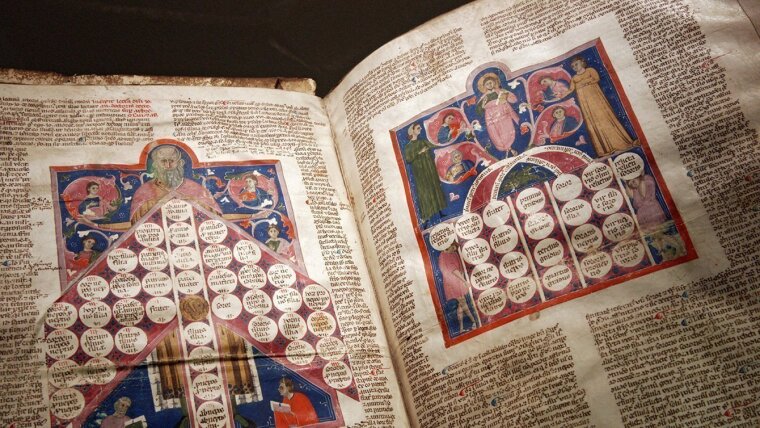
The DFG-funded interdisciplinary research training group investigates texts from Antiquity and the Middle Ages that consciously depend on their original sources and are, in this sense, "heteronomous."
This group of related text forms, which has not yet been systematically documented in context, includes commentaries, paraphrases, compendia, lexicons, chronicles, collections, retold novels, and the like. Such texts contributed significantly to the development of culture and science in Antiquity and the Middle Ages.
They are examined across disciplines to determine how they develop their own "autonomy" through the updating and processing of their original sources on various levels – scientific, cultural, formal, and aesthetic.
The structure of the research training group arises from a network of four interconnected research fields. They comprise four groups of heteronomous texts, which vary in their dependence on their models or pretexts: a) Commentarius - The explanatory-exegetical field, b) Collectio - The anthological-encyclopedic field, c) Continuatio - The continuing-supplementary field, d) Renarratio - The paraphrastic-diegetic field.
Participating Faculties of University of Jena
Faculty of Law, Faculty of Philosophy, Faculty of Theology
Cooperation partners
Akademieprojekt „Die alexandrinische und antiochenische Bibelexegese in der Spätantike“
(Berlin-Brandenburgische Akademie der Wissenschaften); Arbeitsstelle für die Geschichte der antiken Medizin (Berlin-Brandenburgische Akademie der Wissenschaften); Berliner Antike-Kolleg (Humboldt-Universität Berlin); Aristotelismus-Zentrum Berlin (Freie Universität Berlin); Franz Joseph Dölger-Institut/Reallexikon für Antike und Christentum (Universität Bonn); University of Cambridge, Faculty of Philosophy/Trinity College Cambridge; Langzeitprojekt „Historiker der Spätantike“ der Nordrhein-Westfälischen Akademie der Wissenschaften (Heinrich-Heine-Universität Düsseldorf“; Institut für Geschichte und Ethik der Medizin (Friedrich-Alexander-Universität Erlangen-Nürnberg); Association pur l'Étude de la Littérature Apocryphe Chrétienne (AELAC); French Swiss Institute of Biblical Sciences (IRSB) (Université de Lausanne); Ancient Commentators Project (Bloomsbury, London) Institut für Geschichte der Pharmazie und Medizin (Philipps-Universität Marburg);Center of Byzantine and the Black Sea Region Studies (Lomonossow-Unversität Moskau); Institut für Neutestamentliche Textforschung der Westfälischen Wilhelms-Universität Münster; Ancient World Cluster (Wolfson College, Oxford); Jenseits des Kanons: Heterotopien religiöser Autorität im spätantiken Christentum. DFG-Kolleg-Forschungsgruppe (FOR 2770; Regensburg); Sorbonne Université, Faculté des Lettres, Paris; Tschechische Akademie der Wissenschaften Prag; „Aquinas and the Arabs“ Study Group/Marquette University, Wisconsin, USA; Würzburger Altertumswissenschaftliches Zentrum; Zentrum für Augustinus-Forschung, Julius Maximilians-Universität Würzburg
Preferred language:
German or English
Current number of doctoral candidates:
24 employed doctoral researchers, 7 associated doctoral researchers
How can I become a doctoral candidate? What is the method of selection?
There is a two-stage selection process with an assessment center for the doctoral positions (with employment contracts). Calls for application and application deadlines are announced on the website. Associations (without employment contracts) for external doctoral candidates are possible at any time, subject to availability.
Are there fixed dates to apply?
Calls for application and application deadlines are announced on the website. All doctoral positions in the current funding period have already been filled.
Are there possibilities to be funded in this programme?
Funding is administered through employment as doctoral researchers (TV-L 13, 65 %) for 3+1 years.
Interesting for graduates of the following subjects:
Theology (Old Testament, New Testament, Church History), Ancient History, Philosophy, Classical Philology (Greek, Latin), Roman Law, Medieval German Literature, Medieval Latein Philology/Neo-Latin Philology
Degree
Dr. phil., Dr. theol., Dr. iur.
Contact
Coordinator: Oliver Schmerbauch
E-Mail: heteronome.texte@uni-jena.de
Website: https://www.heteronome-texte.deExternal link